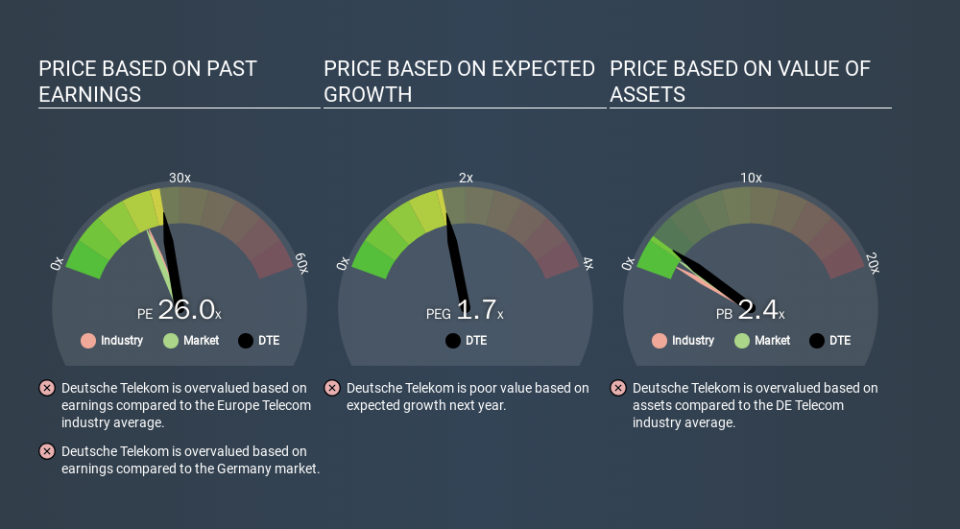Despite Its High P/E Ratio, Is Deutsche Telekom AG (ETR:DTE) Still Undervalued?

This article is written for those who want to get better at using price to earnings ratios (P/E ratios). We'll look at Deutsche Telekom AG's (ETR:DTE) P/E ratio and reflect on what it tells us about the company's share price. Deutsche Telekom has a price to earnings ratio of 25.97, based on the last twelve months. That is equivalent to an earnings yield of about 3.8%.
Check out our latest analysis for Deutsche Telekom
How Do I Calculate Deutsche Telekom's Price To Earnings Ratio?
The formula for P/E is:
Price to Earnings Ratio = Price per Share ÷ Earnings per Share (EPS)
Or for Deutsche Telekom:
P/E of 25.97 = €15.24 ÷ €0.59 (Based on the year to September 2019.)
Is A High Price-to-Earnings Ratio Good?
A higher P/E ratio implies that investors pay a higher price for the earning power of the business. That isn't necessarily good or bad, but a high P/E implies relatively high expectations of what a company can achieve in the future.
How Does Deutsche Telekom's P/E Ratio Compare To Its Peers?
One good way to get a quick read on what market participants expect of a company is to look at its P/E ratio. As you can see below, Deutsche Telekom has a higher P/E than the average company (21.0) in the telecom industry.
Deutsche Telekom's P/E tells us that market participants think the company will perform better than its industry peers, going forward. Shareholders are clearly optimistic, but the future is always uncertain. So investors should delve deeper. I like to check if company insiders have been buying or selling.
How Growth Rates Impact P/E Ratios
Companies that shrink earnings per share quickly will rapidly decrease the 'E' in the equation. Therefore, even if you pay a low multiple of earnings now, that multiple will become higher in the future. So while a stock may look cheap based on past earnings, it could be expensive based on future earnings.
Deutsche Telekom's earnings per share fell by 29% in the last twelve months. But it has grown its earnings per share by 2.7% per year over the last five years. And over the longer term (3 years) earnings per share have decreased 22% annually. This growth rate might warrant a low P/E ratio.
Remember: P/E Ratios Don't Consider The Balance Sheet
Don't forget that the P/E ratio considers market capitalization. So it won't reflect the advantage of cash, or disadvantage of debt. The exact same company would hypothetically deserve a higher P/E ratio if it had a strong balance sheet, than if it had a weak one with lots of debt, because a cashed up company can spend on growth.
Such spending might be good or bad, overall, but the key point here is that you need to look at debt to understand the P/E ratio in context.
Is Debt Impacting Deutsche Telekom's P/E?
Deutsche Telekom's net debt is 84% of its market cap. If you want to compare its P/E ratio to other companies, you should absolutely keep in mind it has significant borrowings.
The Verdict On Deutsche Telekom's P/E Ratio
Deutsche Telekom trades on a P/E ratio of 26.0, which is above its market average of 20.3. With significant debt and no EPS growth last year, shareholders are betting on an improvement in earnings from the company.
Investors should be looking to buy stocks that the market is wrong about. People often underestimate remarkable growth -- so investors can make money when fast growth is not fully appreciated. So this free visual report on analyst forecasts could hold the key to an excellent investment decision.
But note: Deutsche Telekom may not be the best stock to buy. So take a peek at this free list of interesting companies with strong recent earnings growth (and a P/E ratio below 20).
If you spot an error that warrants correction, please contact the editor at editorial-team@simplywallst.com. This article by Simply Wall St is general in nature. It does not constitute a recommendation to buy or sell any stock, and does not take account of your objectives, or your financial situation. Simply Wall St has no position in the stocks mentioned.
We aim to bring you long-term focused research analysis driven by fundamental data. Note that our analysis may not factor in the latest price-sensitive company announcements or qualitative material. Thank you for reading.

 Yahoo Finance
Yahoo Finance 
